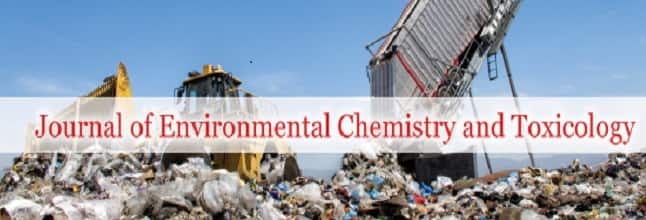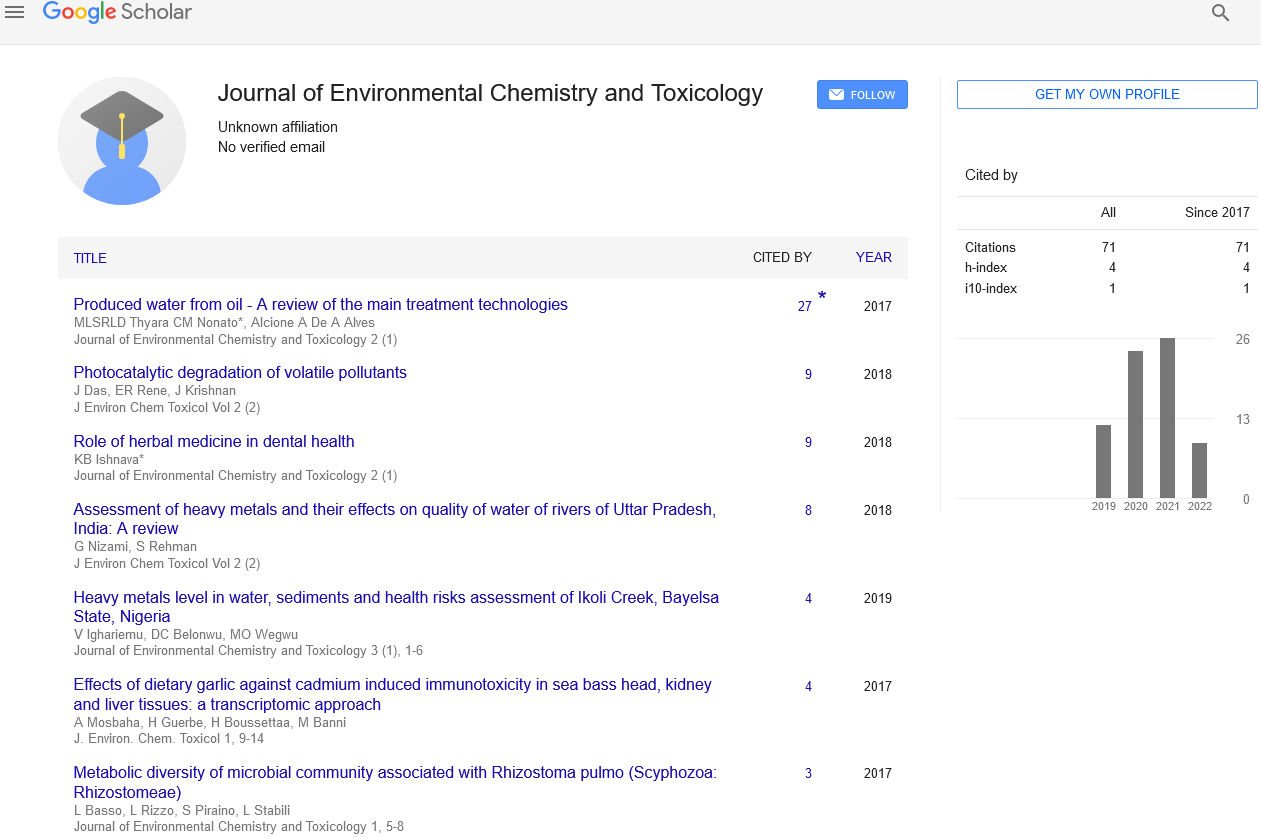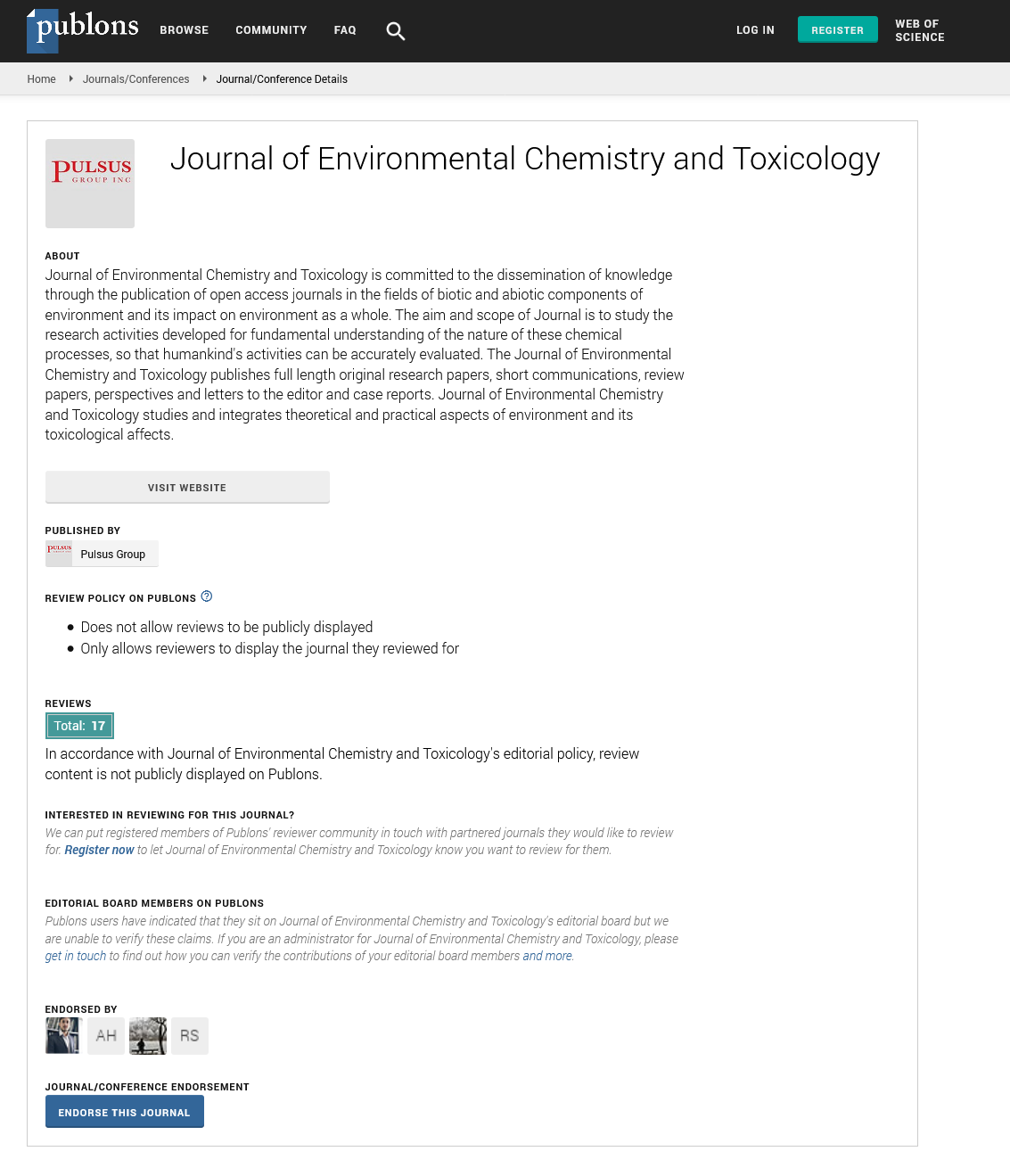Trends in oil and gas research on google scholar database: A bibliometric analysis
Received: 19-May-2023, Manuscript No. pulject-23-6451; Editor assigned: 21-May-2023, Pre QC No. pulject-23-6451 (PQ); Accepted Date: Jun 22, 2023; Reviewed: 22-May-2023 QC No. pulject-23-6451 (Q); Revised: 23-May-2023, Manuscript No. pulject-23-6451 (R); Published: 25-Jun-2023
Citation: Badaru A. Trends in oil and gas research on google scholar database: a bibliometric analysis. J. environ. chem. toxicol.. 2023;7(2):1-3.
This open-access article is distributed under the terms of the Creative Commons Attribution Non-Commercial License (CC BY-NC) (http://creativecommons.org/licenses/by-nc/4.0/), which permits reuse, distribution and reproduction of the article, provided that the original work is properly cited and the reuse is restricted to noncommercial purposes. For commercial reuse, contact reprints@pulsus.com
Abstract
This abstract introduces the concept of bibliometric analysis in the field of oil and gas research, emphasizing its application in Nigeria. It highlights the three steps involved in bibliometric analysis and the optimal conditions for its use. The significance of the oil and gas industry and the role of Google Scholar as a resource are mentioned. Several previous studies are referenced, and a new study focusing on oil and gas research in Nigeria is introduced. The study aims to identify researched areas and areas requiring further exploration.
Key Words
Bibliometric analysis; Oil and gas research; Performance analysis; Science analysis; Network analysis; Google Scholar; Research trends; Sustainable oil and gas research; Global shale gas research; Petroleum analysis
Introduction
The term bibliometric was not known among researchers until it was coined by Albert Pritchard in 1969 and ever since then it has been applied to research outputs particularly in the sciences Bibliometric analysis employs statistical, mathematical, and data mining techniques to reveal the direction of a specific topic area [1]. Performance analysis, science or bibliometric analysis, and network analysis are the three steps in bibliometric analysis. The optimal time to use bibliometric analysis is when there are 200 or more papers up for publication [2]. Any discipline of study, especially the sciences, can be subject to bibliometric analysis, and the oil and gas industry is not.
Oil prospecting in Nigeria started in 1908 by the Nigerian Bitumen Corporation in Araromi, Ondo state, but wasn't discovered until 1956 in Oloiribi, in the Niger delta [3]. Nigeria is the second-largest oil and gas producer in Africa, according to Wikipedia. Every society's progress depends heavily on the oil and gas industry. Google Scholar is one of many resources that index papers related to oil and gas research.
Some books and academic articles can be accessed for free in a number of forms through the database known as Google Scholar. This is because it also draws its resources from other databases, Google Scholar does not always feature free publications. The complete text or metadata of scholarly literature from a variety of publishing formats and fields are indexed by Google Scholar, which is a publicly available web search engine, according to Wikipedia. For narrowing the scope of a search, it has a number of capabilities. Time range, advanced search, reviews on previous articles, field, etc. are a few instances of these features.
Several studies used a range of databases to measure changes in oil and gas research. One study, by used VOS viewer to analyse bibliometric data on sustainable oil and gas research [3]. Another study on global shale gas research trends from 2010 to 2020 was conducted by Baiyegunhi [4]. A bibliometric investigation on the petroleum analysis of Lacustrine sediments from 2014 to 2019 was also carried out by Chigarev [5].
In contrast to the studies mentioned above, this study will use review articles from Google Scholar and will concentrate on oil and gas research in Nigeria. The results of this study will thus show areas that have been researched in Nigeria's oil and gas industry and areas that have not.
Aim
The study's goal is to understand the trends in oil and gas research in Nigeria from the beginning of oil and gas exploration to the present, or from 2006 to 2023.
Objective of the Study
• Determining the most popular search terms used in oil and gas research in Nigeria between 2006 and 2023 in the Google Scholar database.
• Ascertain the top 10 articles on oil and gas research on Google scholar database from 2006-2023.
Research questions
• What are the most popular Google Scholar search terms for oil and gas in Nigeria?
• What are the top ten papers on oil and gas research in Nigeria that were published between 2006 and 2023?
• Which Nigerian institutions were engaged in oil and gas research between 2006 and 2023, according to the Google Scholar database?
Scope
The study focuses on bibliometric examination of oil and gas research published in Nigeria between 2006 and 2023 on Google Scholar.
Literature Review
A bibliometric study on "global research trends and hot topics in library and information science" was carried out by Lotfi and Ouchi in the year 2202. Data were gathered using the scopus database, with a 2011–2020 retrieval window. According to the study's findings, Systematic review, Meta analysis, Medline, Procedure, and Web of Science were the top five most often used keywords in library and information science papers in the Scopus database from 2011 to 2020.
Using bibliometric analysis conducted a study on global shale gas research trends from 2010 to 2020 [6]. The SCI-expanded web of science database. The retrieval period was from 2010 to 2020 .The study's findings indicate that China has the largest shale gas reserve, Li J. has the most papers, and Louck RG has the most citations for his articles[7].
Chigarev examined petroleum deposits in lacustrine sediments between 2014 and 2019. For this investigation, Web of Science, Onepetro, and Scopus databases were employed. The Baiyun sag: A giant rich gas-generation sag in the deep water area of the pearl river mouth basin by Zhang G., Yang H., Chen Y., Ji M., Wang K., Yang D., Hany Y., and Sun Y. is the first among the top five papers on the scopus database for the time period under study, according to the study's findings from the scopus database.
Chigarev conducted research on petroleum engineering using the Lense database. According to the report, China University of Petroleum, Petrochina, Southwest Petroleum University, Sinopec, and China National Petroleum Corporation are the top five universities for petroleum engineering research in the Lens database from 2016 to 2021.
Materials and Methods
This analysis will be based on reviews of oil and gas in Nigeria that were published between 2006 and 2023 in the Google Scholar database. A freely available web search engine called Google Scholar indexes the whole body of scholarly literature from a variety of publishing platforms and academic fields [8]. The bibliometrics research method will be used as the design approach for this study. On Google Scholar's advanced search, the data will be gathered. The advanced search was configured to only return articles that had every word, only had the term in the title, and were published between 2006 and 2023.
Result
According to Table 1, there are 40 keywords from a total of 19 review papers in the Google Scholar database for the time period being studied, and each keyword appears the same number of times.
TABLE 1. 40 most frequent keywords in oil and gas research in Nigeria 2000-2023
| S/no. | Keyword | Frequency |
|---|---|---|
| 1 | Globalization | 1 |
| 2 | Casualization | 1 |
| 3 | Scientific Management | 1 |
| 4 | Business ethics | 1 |
| 5 | Non-unionization | 1 |
| 6 | Environment | 1 |
| 7 | Policies | 1 |
| 8 | Strategies | 1 |
| 9 | Nigeria | 1 |
| 10 | Oil and gas industry | 1 |
| 11 | Environmental disclosure | 1 |
| 12 | Voluntary disclosure | 1 |
| 13 | Mandatory disclosure | 1 |
| 14 | Radioactivity | 1 |
| 15 | Oil producing region | 1 |
| 16 | Human health implications | 1 |
| 17 | Radiation hazard indices | 1 |
| 18 | Crude oil | 1 |
| 19 | Energy | 1 |
| 20 | Exchange markets and natural gas | 1 |
| 21 | Intangible assets | 1 |
| 22 | Leverage | 1 |
| 23 | Firm size | 1 |
| 24 | Return on assets | 1 |
| 25 | Return on capital | 1 |
| 26 | Employed | 1 |
| 27 | Return on equity | 1 |
| 28 | Debt | 1 |
| 29 | Equity | 1 |
| 30 | Debt equity | 1 |
| 31 | ROA | 1 |
| 32 | Green accounting | 1 |
| 33 | Economy | 1 |
| 34 | Prospects | 1 |
| 35 | Challenges | 1 |
| 36 | Financial institution | 1 |
| 37 | Safety policies | 1 |
| 38 | Safety legislations | 1 |
| 39 | Safety regulations | 1 |
| 40 | Risk assessment | 1 |
Table 2 demonstrates that the paper written by EE Okafor in the year 2007 has the most citations, while the piece written by SP Joyce in the year 2020 has the fewest.
TABLE 2. 5 top publication on oil and gas in Nigeria
| S/N | Author | Title | No. of citations | Year |
|---|---|---|---|---|
| 1 | EE Okafor | An analysis of the Nigerian oil and gas industry's predicament in the context of globalisation, casualization, and capitalist business ethics | 85 | 2007 |
| 2 | EL Elenmo and JA Akankali | Gains, problems, and opportunities for Nigeria's oil and gas industry's environmental policies and strategies | 30 | 2014 |
| 3 | BB Babatunde, FD Sikoki and GO Avwiri | Review of the radiation profile's current state in Nigeria's Niger Delta's oil- and gas-producing regions | 26 | 2019 |
| 4 | CB Okafor | Joint development: A different legal strategy for oil and gas production in the conflict over the maritime border between Nigeria and Cameroon | 14 | 2006 |
| 5 | SP Joyce | Environmental disclosure and listed Nigerian oil and gas firms' financial performance: a review of the literature | 9 | 2020 |
Table 3 makes it abundantly evident that just 15 academic institutions in Nigeria participated in review articles on oil and gas in Nigeria throughout the time period under consideration. There are 15 institutions total, of which 8 are federal, 2 are state-owned, and the remaining 5 are privately-owned.
TABLE 3. 5 top institution in oil and gas research in Nigeria on google scholar databases
| S/N | Institution | No. of publications | |
|---|---|---|---|
| 1 | University of Ibadan | 1 | |
| 2 | University of port-harcourt | 2 | |
| 3 | Nnamdi Azikwe university | 2 | |
| 4 | Adamawa state university | 1 | |
| 5 | African university of science and technology | 2 | |
| 6 | Rivers state university | 2 | |
| 7 | Federal university Otuoke | 1 | |
| 8 | Emerald energy institute | 1 | |
| 9 | University of Uyo | 1 | |
| 10 | University of calabar | 1 | |
| 11 | Nigerian maritime university | 1 | |
| 12 | Federal university of technology minna | 1 | |
| 13 | UNN | 1 | |
| 14 | Caritas university | 1 | |
| 15 | Godfrey Okoye university | 1 | |
Discussion & Conclusion
• The review articles under the time period being studied have a total of 40 keywords.
• When compared to other papers, the one written by EE Okafor gets the most citations
• Compared to the number of tertiary institutions in Nigeria, very few institutions have staff members who have reviewed articles on Google Scholar throughout the period covered.
Recommendation
This paper there recommends that more institutions should partake in oil and gas research in Nigeria, so as to boost our visibility.
Competing of Interests
The authors have no competing interests to declare that are relevant to the content of this article.
References
- Donthu N, Kumar S, Mukherjee D, et al. How to conduct a bibliometric analysis: An overview and guidelines. J. Bus. Res.2021;133:285-96. [Google Scholar] [CrossRef]
- Rogers G, Szomszor M, Adams J. Sample size in bibliometric analysis. Scientometrics. 2020;125(1):777-94. [Google Scholar] [CrossRef]
- Tamala JK, Maramag EI, Simeon KA, et al. A bibliometric analysis of sustainable oil and gas production research using VOSviewer. Clean. Eng. Technol. 2022;7:100437. [Google Scholar] [CrossRef]
- Baiyegunhi TL, Baiyegunhi C, Pharoe BK. Global Research Trends on Shale Gas from 2010–2020 Using a Bibliometric Approach. Sustainability. 2022;14(6):3461. [Google Scholar] [CrossRef]
- Chigarev BN. Research trends in Petroleum Engineering Field of Study in 2016–2021 by The Lens data. 2022;1 (36):66-89.1[Google Scholar] [CrossRef]
- Panahi S, Lotfi M, Ouchi A. Global Research Trends and Hot Topics on Library and Information Science: A Bibliometric Analysis. Libr. Philos. Pract. 2022. [Google Scholar]
- Adeola AO, Akingboye AS, Ore OT, et al. Crude oil exploration in Africa: socio-economic implications, environmental impacts, and mitigation strategies. Environ. Syst. Decis. 2022;42(1):26-50.[Google Scholar]
- Elhuni RM, Ahmad MM. Key performance indicators for sustainable production evaluation in oil and gas sector. Procedia Manufacturing. 2017;11:718-24. [Google Scholar] [CrossRef]






